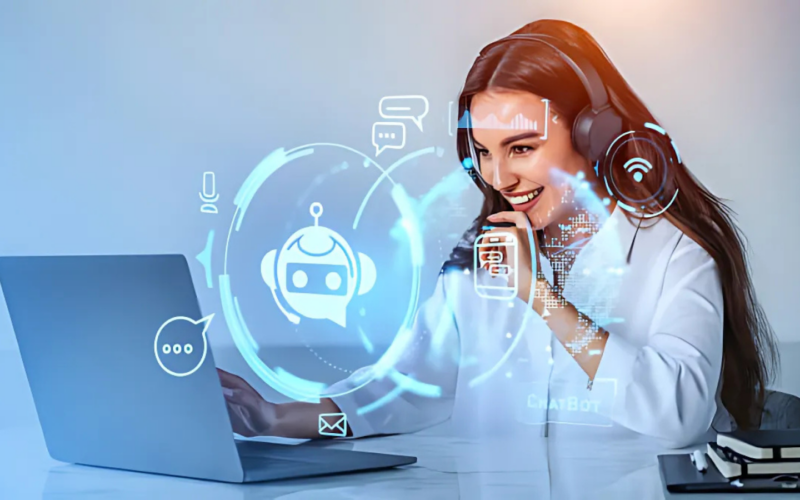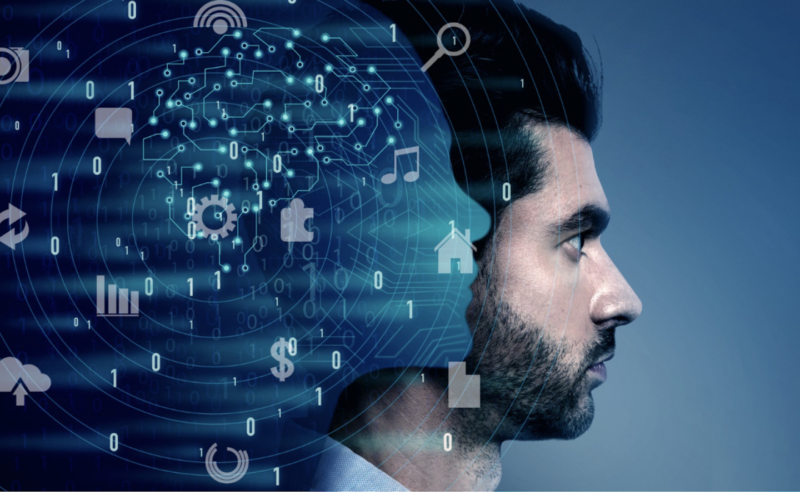AI is reshaping business and education in powerful ways. In business, AI automates customer service with chatbots, while in education, it personalizes learning with adaptive tools. According to a 2025 OECD report, nearly 80% of Indian companies now consider AI a strategic priority.
Yet, many businesses still face challenges in effectively integrating AI into their operations, struggling with scalability, data management, and resource allocation.
In this article, you’ll discover practical examples of artificial intelligence and how you can apply them to overcome everyday challenges in both fields.
Key Takeaways
- AI enhances efficiency: Streamlines operations, automates tasks, and improves decision-making with data analysis.
- Personalization at scale: AI tailors experiences and content, boosting customer and student engagement.
- Cost reduction: AI-driven automation helps reduce manual tasks and development costs.
- Codewave’s AI solutions: We help businesses integrate AI to optimize processes, improve performance, and stay ahead.
AI Applications in Business
Let’s say you’re managing a customer service team, and every day, your agents handle hundreds of queries. It’s exhausting, repetitive, and often leads to delays or errors. Then, you introduce a chatbot powered by AI. It answers common questions instantly, freeing up your team to tackle more complex issues.
This shift not only saves time but improves customer satisfaction. This is just one of the many examples of artificial intelligence in business.
Below are more applications of AI in business:
Automation of Repetitive Tasks with AI
In business, repetitive tasks can be time-draining. They slow down operations and lead to employee burnout. AI, however, offers a simple solution. Here’s how:
- Customer Service: AI-powered chatbots can instantly handle common queries, like order tracking or product details, allowing your customer support team to focus on more complex issues.
- Data Entry: Tools like robotic process automation (RPA) can automatically fill in forms, update records, or process invoices, saving your team from manual data entry.
- Inventory Management: AI systems can track stock levels, predict demand, and reorder products automatically, ensuring you never run low on essential items.
Data-Driven Decision Making with AI
Making decisions based on intuition alone can lead to costly mistakes. AI helps businesses make smarter, data-backed choices by analyzing vast amounts of data. Here’s how:
- Sales Forecasting: AI analyzes past sales trends and market conditions to predict future demand, helping you plan stock and marketing strategies more effectively.
- Customer Insights: AI tools can dive deep into customer data, providing valuable insights on buying patterns, preferences, and behavior, allowing you to fine-tune your offerings.
- Market Analysis: AI can quickly process external factors like market trends or competitor strategies, giving you a clearer picture of where your business stands.
Personalization and Customer Experience with AI
Customers expect experiences tailored to their needs, and AI makes that possible. Here’s how it’s done:
- Product Recommendations: AI algorithms track customer behavior to suggest products based on past purchases, increasing conversion rates and customer satisfaction.
- Customized Marketing: AI helps create personalized emails, offers, and content, ensuring that each message speaks to individual preferences, leading to higher engagement.
- Customer Support: AI-powered chatbots offer 24/7 support, providing immediate responses and personalized assistance, creating a smoother customer journey.
AI in Marketing
Marketing can be a guessing game, but AI takes the guesswork out. Here’s how it sharpens your marketing strategy:
- Targeted Advertising: AI analyzes customer behavior to create hyper-targeted ads, ensuring your message reaches the right people at the right time.
- Content Creation: AI tools help generate blog posts, social media updates, and even video scripts, saving you time while keeping your content fresh and relevant.
- Sentiment Analysis: AI scans social media and reviews to gauge public opinion, helping you adjust your messaging and campaigns in real-time.
AI in HR and Recruitment
Hiring the right talent can be a lengthy and subjective process. AI can streamline and improve it:
- Resume Screening: AI tools can quickly scan resumes, identify the best candidates based on keywords, skills, and experience, and eliminate human bias in the process.
- Predictive Hiring: AI analyzes data from previous hires to predict which candidates are most likely to succeed in a role, reducing turnover and improving hiring success.
- Employee Performance Tracking: AI tracks key performance metrics, helping HR teams monitor employee progress and provide timely feedback for growth and development.
Facing challenges with automating processes or predicting business trends? Explore Codewave’s AI/ML Development services, where we help you implement intelligent solutions that optimize your operations. Let’s turn your data into actionable insights!
Now, let’s explore how examples of artificial intelligence are transforming the way we teach and learn.
AI Applications in Education
Suppose you’re a teacher with a classroom full of students at varying levels of understanding. Trying to give each one the attention they need can be overwhelming. AI can help by personalizing learning for every student.
For instance, adaptive learning platforms adjust lessons based on each student’s progress, ensuring no one falls behind.
Let’s take a closer look at how AI is making education smarter:
Personalized Learning with AI
Every student learns differently, but keeping up with their individual needs can be challenging. AI helps by tailoring learning experiences to each student’s pace and style. Here’s how:
- Adaptive Learning Platforms: AI-powered systems track students’ progress and adjust lessons, quizzes, and exercises to match their abilities, ensuring they aren’t overwhelmed or bored.
- Real-Time Feedback: AI tools provide instant feedback, helping students improve continuously without waiting for teacher assessments.
- Custom Learning Paths: AI can suggest specific resources and exercises based on each student’s strengths and weaknesses, guiding them toward better results.
Intelligent Content Creation with AI
Creating quality educational content takes time, but AI can speed up the process while ensuring it’s relevant and engaging. Here’s how:
- Automated Lesson Plans: AI tools can generate lesson plans, quizzes, and study guides based on curriculum guidelines, saving teachers hours of planning.
- Content Customization: AI analyzes student data to create tailored content, whether it’s extra reading material or practice problems, ensuring the content aligns with each student’s needs.
- Grading and Assessment: AI can grade assignments, quizzes, and even essays, providing consistent, unbiased assessments that free up educators to focus on teaching.
Virtual Assistants for Students with AI
Managing tasks and assignments can overwhelm students, especially with deadlines piling up. AI-powered virtual assistants step in to help organize and guide them through their work. Here’s how:
- Homework Assistance: Virtual assistants can provide instant help with homework, offering explanations, resources, or even guiding students through problem-solving steps.
- Schedule Management: AI can help students plan their study time, set reminders for assignments, and ensure they stay on top of their academic responsibilities.
- Instant Answers: Students can ask virtual assistants for quick answers to questions or clarifications, making learning more accessible and less stressful.
AI for Teacher Support
Teachers juggle a lot, from lesson planning to grading, which can take up valuable time. AI can ease this burden and help them focus more on teaching. Here’s how:
- Automated Grading: AI can grade assignments and quizzes, providing instant feedback to students and saving teachers hours of work.
- Attendance Tracking: AI tools can automatically track attendance and alert teachers to any patterns of absenteeism, helping them stay on top of student engagement.
- Performance Analytics: AI analyzes student data to highlight areas where students may need extra help, allowing teachers to adjust their approach in real-time.
Explore how AI is transforming education with our latest insights on tools, challenges, and future trends. Stay ahead by reading more!
As AI continues to grow in business and education, it’s important to consider the ethical implications. Let’s explore some key concerns and examples of artificial intelligence in this context.
The Ethical Considerations of AI in Business and Education
Privacy experts warn that AI-driven data collection is so comprehensive and opaque that users are rapidly losing control over their personal information. In business and education, this raises significant concerns about how AI systems handle sensitive data.
For instance, schools using AI to track student progress may unintentionally expose private student information.
Below are some ethical considerations to keep in mind:
1. Bias in AI Algorithms
AI systems can unintentionally perpetuate biases, reflecting existing prejudices in society, like racial or gender bias in hiring algorithms or educational assessments.
Solution: Regularly audit AI systems for bias, use diverse datasets during training, and involve multidisciplinary teams to ensure fairness and inclusivity in AI decision-making.
2. Lack of Transparency in AI Decisions
Many AI systems operate as “black boxes,” making decisions without clear explanations. This is especially problematic in sectors like education and healthcare, where decisions impact individuals’ lives.
Solution: Implement explainable AI (XAI) to ensure that AI systems provide understandable, transparent reasoning behind their decisions, allowing users to trust and challenge them if needed.
3. Data Privacy in AI-Powered Education
AI systems in schools collect massive amounts of student data, raising concerns about unauthorized access or misuse of sensitive information.
Solution: Adopt strict data protection regulations, anonymize data wherever possible, and ensure clear, informed consent from students and parents before collecting or using their information.
4. Job Displacement due to AI Automation
As AI automates more tasks in business, many jobs are at risk of being replaced, leaving workers without clear alternatives.
Solution: Focus on retraining and reskilling programs for employees to transition into new roles. Companies can also implement AI as a tool to enhance workers’ skills rather than replace them entirely.
5. Over-reliance on AI in Education
Relying too heavily on AI for personalized learning may undermine the role of teachers, leading to a loss of human interaction, which is vital for student growth.
Solution: Use AI as a supplement, not a replacement. Teachers should remain central to the learning process, with AI providing support where needed, like personalized learning paths or administrative tasks.
6. Unintended Consequences in AI Use
AI applications in business or education can sometimes create unintended negative consequences, such as AI recommending harmful content or reinforcing unhealthy consumer habits.
Solution: Continually monitor AI systems and gather feedback from users to identify any harmful side effects. Develop proactive measures to adjust AI behavior before it causes damage.
Let’s now take a look at where AI is headed in business and education and what the future might hold.
The Future of AI in Business and Education
In the near future, AI might play a larger role in automating complex decision-making in businesses and classrooms alike. Its role will expand from basic automation to more complex, predictive tasks that can transform both industries.
Below are some possible future trends in AI:
- AI-Driven Emotional Intelligence in the Workplace
AI could evolve to understand and respond to human emotions more effectively. Imagine an AI system that can sense employee stress levels during meetings and suggest a break or offer a calming activity.
For example, AI assistants could adjust the tone of communication based on the emotional state of the user, ensuring better interaction.
- AI-Powered Personalized Career Development Plans
In the future, AI could track your career progress, skills, and aspirations, then create a personalized growth plan. It could suggest online courses, mentor connections, or even job shifts based on your professional journey.
Instead of generic job recommendations, AI could suggest specific roles and training that align with your evolving skills and interests.
- AI-Generated Custom Textbooks for Students
Rather than using standard textbooks, AI could generate personalized learning materials based on a student’s needs, interests, and learning pace.
If a student struggles with certain math concepts, the AI could offer an entire chapter dedicated to those concepts, explained in ways that best suit the student’s learning style.
- AI-Based Cognitive Fatigue Detection
In both business and education, AI could monitor cognitive load and fatigue. It would assess when a person is mentally drained and recommend strategies like micro-breaks or alternative tasks to keep performance optimal.
During a long workday, an AI system could prompt you to take a mental break, suggest meditation, or give you a short, interactive task to refresh your mind.
- AI-Assisted Ethical Decision Making in Businesses
AI could assist businesses in making decisions that align with ethical standards. Instead of solely analyzing profit, it could weigh social impact, sustainability, and employee well-being, helping organizations maintain ethical balance in their operations.
A company looking to launch a new product might use AI to simulate the social and environmental consequences, guiding decision-makers toward more responsible choices.
Struggling to integrate AI into your operations? Explore Codewave’s Custom Software Development services, where we build AI-powered solutions tailored to your business needs. Let’s bring your ideas to life!
Start by exploring how AI can improve your daily operations, whether it’s through automation or personalized learning experiences. Take small steps, perhaps try integrating an AI tool in your workflow or experiment with AI-based learning platforms.
How Codewave Can Help You Integrate AI Across Industries
When you’re ready to integrate AI into your business, you need a partner who understands the nuances of both technology and your industry. At Codewave, we help you bridge the gap between your ideas and impactful AI-driven solutions that fit your unique needs.
Whether it’s using AI chatbots for customer service, predictive analytics for operations, or personalized content for user experiences, we’ve got you covered.
Struggling to make sense of complex data or improve customer engagement? Take a look at our portfolio to see how we’ve helped businesses like yours bring their ideas to life with AI.
What You Get with Codewave’s AI Development Services:
- 60% improvement in speed and efficiency of your app development process, thanks to our AI-powered optimization.
- 3x faster deployment, enabling quicker go-to-market timelines with AI-enhanced workflows.
- Save up to 3 weeks every month by streamlining development, reducing manual tasks, and automating key processes.
- 25% reduction in development costs through smart automation and AI-driven optimization, making the process more cost-effective.
Our AI-Driven Services Include:
- AI Strategy Consultation: We evaluate your current setup and create a roadmap to integrate AI that aligns with your goals and drives scalability.
- AI Solution Design & Development: From concept to deployment, we build AI-powered applications to enhance engagement and optimize operations.
- AI Integration for Business & Education: We integrate AI into your systems for real-time data analysis, personalized experiences, and predictive analytics.
- AI-Powered Dashboards & Analytics: Our AI tools provide insights that help you track performance, make smarter decisions, and stay ahead.
Curious to see what your data is really capable of? Book a free demo with Codewave’s experts and discover how we can turn your data into real results.
FAQs
Q. How is AI used to personalize customer experiences in business?
A. AI is widely used to personalize customer experiences by analyzing user data and behavior. For example, e-commerce platforms like Amazon and Netflix use AI to recommend products or shows based on past interactions. AI algorithms predict customer preferences and dynamically adjust product recommendations, leading to more relevant and tailored experiences.
Q. Can AI improve decision-making processes in education?
A. Yes, AI can improve decision-making in education by analyzing large amounts of data from student performance. For example, AI-powered tools can predict student outcomes, identify learning gaps, and recommend personalized learning paths. Systems like adaptive learning platforms adjust the content and pace based on individual student needs, helping educators make data-driven decisions.
Q. How do AI digital assistants help businesses with everyday tasks?
A. AI digital assistants like Siri, Alexa, or enterprise solutions like Microsoft Cortana help businesses automate routine tasks such as scheduling meetings, sending reminders, managing emails, and organizing workflows. These assistants free up valuable time, allowing employees to focus on more strategic tasks and improving overall productivity.
Q. How does AI support content creation in business and education?
A. AI is transforming content creation by automating repetitive tasks such as writing reports, summarizing articles, or generating presentations. Tools like GPT-3 can help create high-quality written content for businesses, while in education, AI can help generate personalized learning materials, quizzes, or even virtual tutors, enabling educators to focus more on interactive and engaging activities.
Q. How does AI-powered grading and feedback work in education?
A. AI-powered grading tools are used to grade assignments, essays, and exams faster and more accurately than traditional methods. These systems use natural language processing and machine learning to assess written responses, provide personalized feedback, and even suggest areas for improvement.
Codewave is a UX first design thinking & digital transformation services company, designing & engineering innovative mobile apps, cloud, & edge solutions.







